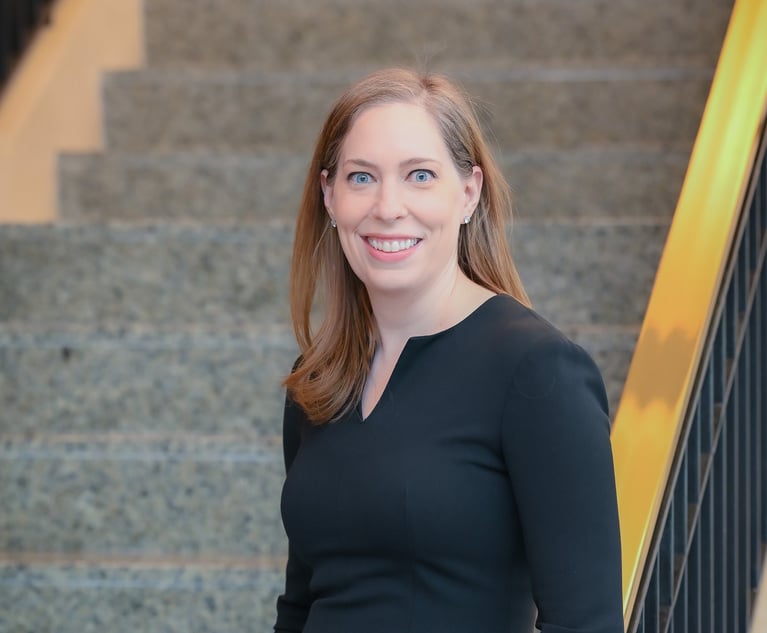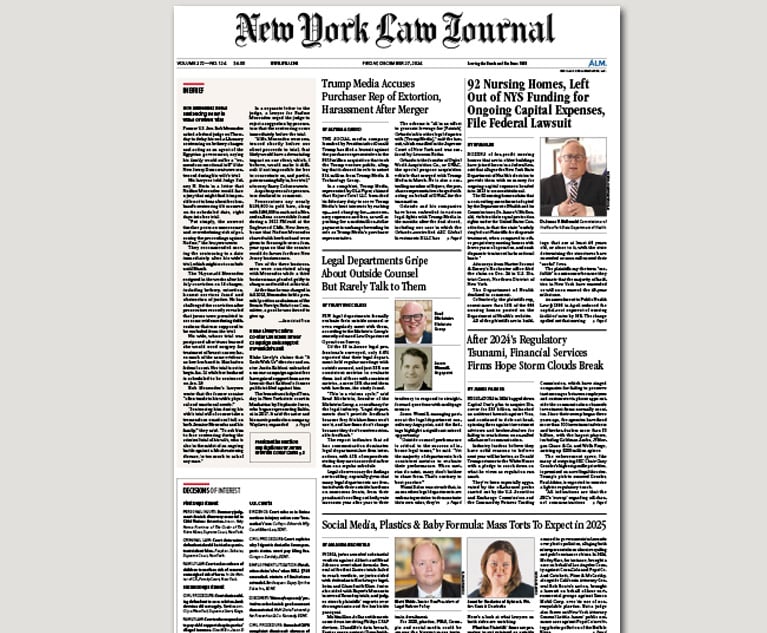 Blaine “Fin” Fogg of Skadden, Arps, Slate, Meagher & Flom.
Blaine “Fin” Fogg of Skadden, Arps, Slate, Meagher & Flom.Fin Fogg, Who Helped Build Skadden's M&A Prowess, Dies at 79
Blaine "Fin" Fogg was one of Joseph Flom's top lieutenants, helping fuel Skadden's rise during the M&A boom years of the 1970s and 1980s.
July 16, 2019 at 02:13 PM
4 minute read
Blaine “Fin” Fogg, an early mergers and acquisitions lawyer at Skadden, Arps, Slate, Meagher & Flom who helped the firm launch its Paris office, died Sunday at age 79.
The cause of death was brain cancer, according to his son William Fogg, a partner at Cravath, Swaine & Moore.
Fin Fogg's partners and son praised him as a lawyer and a person. Will Fogg said he went into law because “I wanted to be like my father.” In his later years, Will said, Fin pushed friends and colleagues to give to charitable causes like Mount Sinai Health System, where he was a trustee for over 30 years, and the Legal Aid Society of New York, where he served as president.
“Some of my partners would ask him to lay off. He wouldn't; he would keep pushing it,” Will said. “He had a slogan; he'd call all the firms, saying, '100 [thousand dollars] is the new 50.'”
Fin Fogg joined Skadden in 1966 as a lateral associate and became one of Joseph Flom's lieutenants during the M&A boom in the 1970s and 1980s. In 1990, he moved to Paris to help the firm gain a foothold there and helped it grow its restructuring business when the economy cooled.
He was one of the “four horsemen”—along with Morris Kramer, Roger Aaron and Peter Atkins—who worked under Flom on some of the biggest hostile takeovers and corporate transactions that built the firm's reputation.
“There wasn't even an M&A field when we started,” said Atkins. “We were just corporate lawyers.”
Atkins said Fogg was particularly close to Sir James Goldsmith, a prominent British tycoon who turned to Skadden for help with complex transactions. He added that Fogg co-authored a book on the Hart-Scott-Rodino Antitrust Improvements Act and said he was well-versed in the notice and regulatory requirements of acquiring big stakes in public companies.
Skadden partner Ann Beth Stebbins and retired partner David Friedman both described learning the ropes from Fogg. Friedman said Fogg taught him about the importance of high-quality work; he recalled one night, early in his time at the firm, that he drafted a 40-page corporate profile on Marathon Oil. The next day, Fogg reviewed it, and told him to pare it back to three or four pages.
“It made me think and taught me a life lesson,” he said. “While you can turn out a real work product, you've got to think about what's important to the client.”
Stebbins said that her first interaction came shortly after she joined the firm in 1994, when the senior associate tasked with leading a drafting session in International Paper's acquisition of Federal Paper Board didn't show up because of bad weather. She said she looked at the front cover of the Form S-4, where Fogg's name was listed, called his office, and asked for “Blaine.”
He rolled up his sleeves, came to the conference room and saved the day, she said, even though it was normally a task for a senior associate or a junior partner. Over the years, she learned a lot more from him.
“He would love to talk about the possibilities, the things maybe you hadn't fleshed out,” Stebbins said. “'Did you go down this path? Did you try this? Did you try that?'”
Nearly everyone who remembered Fogg remembered his love for and skill at golf. Atkins said it was as though he had been playing since three months old. Even after his first brain surgery, when he'd been told that he had a year to live, remembered Will, he jumped at the opportunity to play at Liberty National.
“He didn't have any surrender in him,” Will said.
Fogg is survived by his wife, Diane; his children, William, Matthew and Katherine and their spouses; by his brother Sanford; and by five grandchildren, according to a Cravath spokesman. A memorial service will be held on July 23, 2019, at 10 a.m. at the Kaufmann Concert Hall at the 92nd Street Y.
This content has been archived. It is available through our partners, LexisNexis® and Bloomberg Law.
To view this content, please continue to their sites.
Not a Lexis Subscriber?
Subscribe Now
Not a Bloomberg Law Subscriber?
Subscribe Now
NOT FOR REPRINT
© 2024 ALM Global, LLC, All Rights Reserved. Request academic re-use from www.copyright.com. All other uses, submit a request to [email protected]. For more information visit Asset & Logo Licensing.
You Might Like
View All
Elizabeth Cooper of Simpson Thacher on Building Teams in a 'Relationship Business'
4 minute read
Changes at the Top: How 'Different Leadership Skills' Are Prevailing in Big Law

After 2024's Regulatory Tsunami, Financial Services Firms Hope Storm Clouds Break
Trending Stories
- 1It's Time To Limit Non-Competes
- 2Jimmy Carter’s 1974 Law Day Speech: A Call for Lawyers to Do the Public Good
- 3Second Circuit Upholds $5M Judgment Against Trump in E. Jean Carroll Case
- 4Clifford Chance Hikes Partner Pay as UK Firms Fight to Stay Competitive on Compensation
- 5Judicial Conduct Watchdog Opposes Supreme Court Justice's Bid to Withdraw Appeal of Her Removal
Who Got The Work
Michael G. Bongiorno, Andrew Scott Dulberg and Elizabeth E. Driscoll from Wilmer Cutler Pickering Hale and Dorr have stepped in to represent Symbotic Inc., an A.I.-enabled technology platform that focuses on increasing supply chain efficiency, and other defendants in a pending shareholder derivative lawsuit. The case, filed Oct. 2 in Massachusetts District Court by the Brown Law Firm on behalf of Stephen Austen, accuses certain officers and directors of misleading investors in regard to Symbotic's potential for margin growth by failing to disclose that the company was not equipped to timely deploy its systems or manage expenses through project delays. The case, assigned to U.S. District Judge Nathaniel M. Gorton, is 1:24-cv-12522, Austen v. Cohen et al.
Who Got The Work
Edmund Polubinski and Marie Killmond of Davis Polk & Wardwell have entered appearances for data platform software development company MongoDB and other defendants in a pending shareholder derivative lawsuit. The action, filed Oct. 7 in New York Southern District Court by the Brown Law Firm, accuses the company's directors and/or officers of falsely expressing confidence in the company’s restructuring of its sales incentive plan and downplaying the severity of decreases in its upfront commitments. The case is 1:24-cv-07594, Roy v. Ittycheria et al.
Who Got The Work
Amy O. Bruchs and Kurt F. Ellison of Michael Best & Friedrich have entered appearances for Epic Systems Corp. in a pending employment discrimination lawsuit. The suit was filed Sept. 7 in Wisconsin Western District Court by Levine Eisberner LLC and Siri & Glimstad on behalf of a project manager who claims that he was wrongfully terminated after applying for a religious exemption to the defendant's COVID-19 vaccine mandate. The case, assigned to U.S. Magistrate Judge Anita Marie Boor, is 3:24-cv-00630, Secker, Nathan v. Epic Systems Corporation.
Who Got The Work
David X. Sullivan, Thomas J. Finn and Gregory A. Hall from McCarter & English have entered appearances for Sunrun Installation Services in a pending civil rights lawsuit. The complaint was filed Sept. 4 in Connecticut District Court by attorney Robert M. Berke on behalf of former employee George Edward Steins, who was arrested and charged with employing an unregistered home improvement salesperson. The complaint alleges that had Sunrun informed the Connecticut Department of Consumer Protection that the plaintiff's employment had ended in 2017 and that he no longer held Sunrun's home improvement contractor license, he would not have been hit with charges, which were dismissed in May 2024. The case, assigned to U.S. District Judge Jeffrey A. Meyer, is 3:24-cv-01423, Steins v. Sunrun, Inc. et al.
Who Got The Work
Greenberg Traurig shareholder Joshua L. Raskin has entered an appearance for boohoo.com UK Ltd. in a pending patent infringement lawsuit. The suit, filed Sept. 3 in Texas Eastern District Court by Rozier Hardt McDonough on behalf of Alto Dynamics, asserts five patents related to an online shopping platform. The case, assigned to U.S. District Judge Rodney Gilstrap, is 2:24-cv-00719, Alto Dynamics, LLC v. boohoo.com UK Limited.
Featured Firms
Law Offices of Gary Martin Hays & Associates, P.C.
(470) 294-1674
Law Offices of Mark E. Salomone
(857) 444-6468
Smith & Hassler
(713) 739-1250







